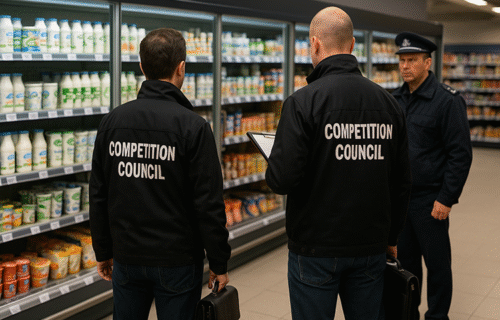Regulators across Central Europe are stepping up oversight of large retailers amid growing concerns about the balance of power between supermarket chains and their suppliers. The latest example came from Romania, where the Competition Council (RCC) launched unannounced inspections at six major retail groups suspected of unfair practices in the dairy sector.
The dawn raids targeted retailers active across supermarket, hypermarket and cash-and-carry formats. According to the RCC, the inspections form part of an ongoing inquiry into compliance with Law No. 81/2022, which transposes EU Directive 2019/633 on unfair trading practices in the agricultural and food supply chain. The legislation aims to prevent abuses of bargaining power by larger buyers and to protect smaller producers from exploitative contract terms.
The RCC said evidence gathered during its market study on milk and dairy products had revealed potential irregularities, including delayed payments for perishable goods, excessive cumulative discounts, and delisting threats linked to shelf-access fees. The authority underlined that the inspections do not imply guilt but are intended to verify whether contractual relationships between retailers and suppliers comply with the law. If infringements are confirmed, fines could reach RON 600,000 or 1 % of annual turnover, and companies may be ordered to cease the conduct.
Although the Competition Council did not name the firms involved, Romanian media identified the chains as Metro, Selgros, Auchan, Carrefour, Kaufland, and Mega Image. The case forms part of a broader sector-wide review of the dairy and wider agri-food market and reflects Romania’s commitment to aligning national enforcement with EU policy objectives.
Romania’s action is not isolated. Other Central European authorities have also strengthened scrutiny of buyer-supplier relationships in recent years.
In Poland, the Competition and Consumer Protection Office (UOKiK) has pursued several investigations into retailer conduct and continues to highlight agri-food supply chains as a priority area. Enforcement has focused on payment terms, rebate structures, and supplier contracts.
The Czech Competition Authority (ÚOHS) applies its national “significant market power” rules to the food sector and has issued fines where larger chains used contractual leverage against smaller producers.
In Austria, the Federal Competition Authority (AFCA) completed a sector inquiry into the food industry, identifying systemic issues such as payment-term pressures and limited transparency in commercial negotiations. The findings have led to plans for enhanced monitoring throughout 2025.
Other countries, including Slovakia, Hungary, Slovenia, Croatia, and Bulgaria, have reinforced their frameworks through national laws implementing the same EU directive. Croatia’s law extends its reach to contracts governed by foreign law when domestic effects are felt, while Slovenia combines competition enforcement with an ombudsman dedicated to supplier complaints.
Across the region, authorities are aligning around the same goal: ensuring fair dealing in the food chain and curbing practices that disadvantage primary producers. Inflation, supply-chain cost pressures, and market concentration have sharpened the focus on retailer behaviour.
The Romanian raids mark one of the most visible enforcement steps so far and underline a coordinated Central European shift toward active policing of unfair trading practices in food retail. More investigations—particularly in sensitive sectors such as dairy, meat, and fresh produce—are expected as national regulators follow through on EU-wide commitments to protect smaller suppliers and restore fair competition in the agricultural supply chain.
